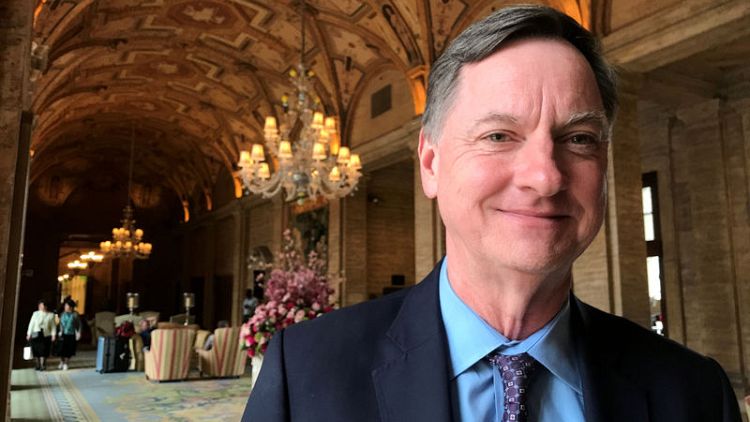By Johan Ahlander and Ann Saphir
STOCKHOLM/STANFORD, Calif. (Reuters) - Two Federal Reserve policymakers on Friday said they were increasingly worried about weak inflation, an indication that some U.S. central bankers see a growing case for a future interest rate cut even as others push for continued patience.
Chicago Fed President Charles Evans, speaking at a conference in Stockholm, said this year's drop in inflation excluding the impact of food and energy was worrisome. He said he was also concerned the economy might underperform.
"Then policy may have to be left on hold - or perhaps even loosened," Evans said in his speech.
St. Louis Fed President James Bullard was even more emphatic about his concern about the softness in so-called core inflation, which rose only 1.6 percent in the 12 months through March, well below the Fed's 2 percent target.
"If we go through the summer here and inflation expectations are still too low and actual inflation doesn't seem to be picking up then I think the level of my concern would get more intense," Bullard told Reuters in an interview.
"I am open to a rate cut to try to combat this, but it would be a rate cut not because of bad data on the U.S. economy. It would be a rate cut because we want to make sure that inflation expectations and eventually actual inflation is more consistent with our 2 percent target," Bullard said.
The remarks by Evans and Bullard, who both have a vote on Fed policy this year, contrasted with Fed Chairman Jerome Powell's comments to reporters after the release of the central bank's latest policy statement on Wednesday.
Powell repeatedly answered questions about the prospect of a rate cut by saying there was no strong case for moving rates in either direction.
That sentiment was echoed on Friday by another senior policymaker, Fed Vice Chair Richard Clarida.
He said the U.S. economy was in a "very good place," with inflation expectations seemingly "stable," and that the central bank had time to look at incoming data before deciding on any further interest rate changes.
FED'S CONUNDRUM
Data pointing to economic strength, highlighted by a jobs report on Friday that showed the unemployment rate fell to its lowest level in nearly 50 years in April, and inflation that may be signalling underlying weakness is a conundrum for the Fed.
"Underlying inflation trends may be mired below 2 percent," said Evans in Stockholm, noting that the Fed could some of the credibility that would be needed to fight future recessions if it can't hit its inflation target.
But he added that it was also possible inflation could surge and require rate hikes "over time."
Bullard, in an earlier interview with CNBC, said the current level of inflation was making him a little nervous and that the Fed's gradual three-year tightening cycle, which ended in December, might be constraining the economy despite signs of robust growth.
"We're a little tight," Bullard said, referring to the federal funds rate, which the central bank uses to control borrowing costs. It is currently set in a range of 2.25 percent to 2.50 percent.
The Fed is increasingly under pressure from U.S. President Donald Trump to ease monetary policy, a situation that has raised concerns about the central bank's ability to maintain its independence.
Trump, who has said recent rate hikes have undercut his efforts to boost economic growth, called on Tuesday for rates to be cut by a full percentage point. The top White House economic adviser on Friday said the central bank would likely move in that direction.
"With these low inflation numbers, I think the Fed is actually looking at rate cuts," White House National Economic Council Director Larry Kudlow told Fox Business Network. "Our views right now intellectually are not really far apart from the Federal Reserve."
Kudlow has said the Fed is free to set policy as it sees fit, while Powell and other U.S. central bankers have insisted they operate independently from political pressure.
(Reporting by Johan Ahlander in Stockholm and Ann Saphir and Howard Schneider in Stanford, California; Writing by Jason Lange in Washington; Editing by Paul Simao and Dan Burns)



